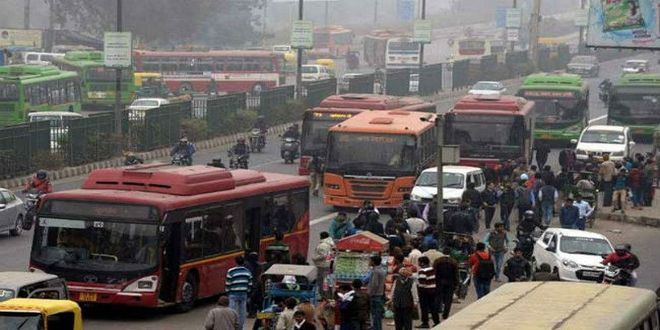New Delhi: Delhi government’s proposal to procure 1,000 low floor electric buses to augment the public transport system in Delhi and combat the problem of air pollution, which was cleared by the cabinet, was questioned by the Supreme Court on July 2. In the affidavit filed in response to Supreme Court’s queries, the Delhi government on July 19, informed the apex court that in-principle approval has been given by the cabinet on July 11 for procurement of 1,000 low floor electric buses and as per the approval, Delhi Integrated Multi-Modal Transit System (DIMTS) has been appointed as consultant for the project. In the affidavit, the Delhi government replied to all the other questions of the Supreme Court which asked about the time required to set up charging stations for electric buses, their nature and quality. The apex court on July 2 has also asked the Delhi government to consider the possibility of using Hydrogen fuel cell-powered buses, which are considered cost-effective as compared to electric vehicles. For the same, the Delhi government was asked to file an affidavit within two weeks.
Also Read: Delhi Air Pollution: Introducing A Fleet Of 1,000 Electric Buses Likely To Improve Air Quality
Taking the green initiative a step ahead and sharing details of the charging stations to be set up for nine to 12 metres long electric buses, the Delhi government said,
The time frame for setting up of charging stations for electric buses will be about 9-11 months from the date of award of contract to the concessionaries who will induct pure electric buses. This is in consonance with the policy of GNCTD (Government of National Capital Territory of Delhi) to combat air pollution in Delhi.
As far as nature, quality and description of electric buses are concerned, the details can be shared only after the consultant submits its report, said the Delhi government. The low-floor electric buses are expected to arrive from June-July 2019 onwards and the estimated cost is Rs. 2,500 crore.
Delhi Government On HCNG Fuel Buses
Replying to Supreme Court’s suggestion on using Hydrogen fuel cell-powered buses, the Delhi government said,
However, since this technology is presently at an evolving stage in the world and hydrogen powered fuel cell buses have not found large scale usages; it is difficult to reach to any definite conclusion at this stage. Accordingly, it would be appropriate that the concerned ministries of Government of India, such as Ministry of Road Transport and Highways, Ministry of Heavy Industries, and others may examine various aspects relating to the issue and lay down broader policy framework and road map for enabling the induction and running of hydrogen powered fuel cell buses in the NCT of Delhi.
Despite this, the Delhi government is exploring the possibility of shifting to hydrogen powered fuel buses. For the same, on July 19, cabinet minister Kailash Gahlot, interacted with senior officials of IOC (Indian Oil Corporation), IGL (Indraprastha Gas Limited), TATA, Ashok Leyland, DIMTS and Transport Department to explore the option of Hydrogen Fuel Cell buses in Delhi.
Interacted with senior officials of IOC, IGL, TATA, Ashok Leyland, DIMTS and Transport Dept to explore the option of ‘Hydrogen Fuel Cell’ Buses in Delhi. pic.twitter.com/Ci6BPgAOKD
— Kailash Gahlot (@kgahlot) July 19, 2018
Though, the Delhi government has not given a clear reply on using Hydrogen fuel cell-powered buses, but in the affidavit, it talked about its pilot project. The project in association with the research and development division of Indian Oil Corporation focusses on running existing buses on HCNG Fuel (a blend of hydrogen gas and CNG).
With inputs from PTI
NDTV – Dettol Banega Swachh India campaign lends support to the Government of India’s Swachh Bharat Mission (SBM). Helmed by Campaign Ambassador Amitabh Bachchan, the campaign aims to spread awareness about hygiene and sanitation, the importance of building toilets and making India open defecation free (ODF) by October 2019, a target set by Prime Minister Narendra Modi, when he launched Swachh Bharat Abhiyan in 2014. Over the years, the campaign has widened its scope to cover issues like air pollution, waste management, plastic ban, manual scavenging and menstrual hygiene. The campaign has also focused extensively on marine pollution, clean Ganga Project and rejuvenation of Yamuna, two of India’s major river bodies.






























